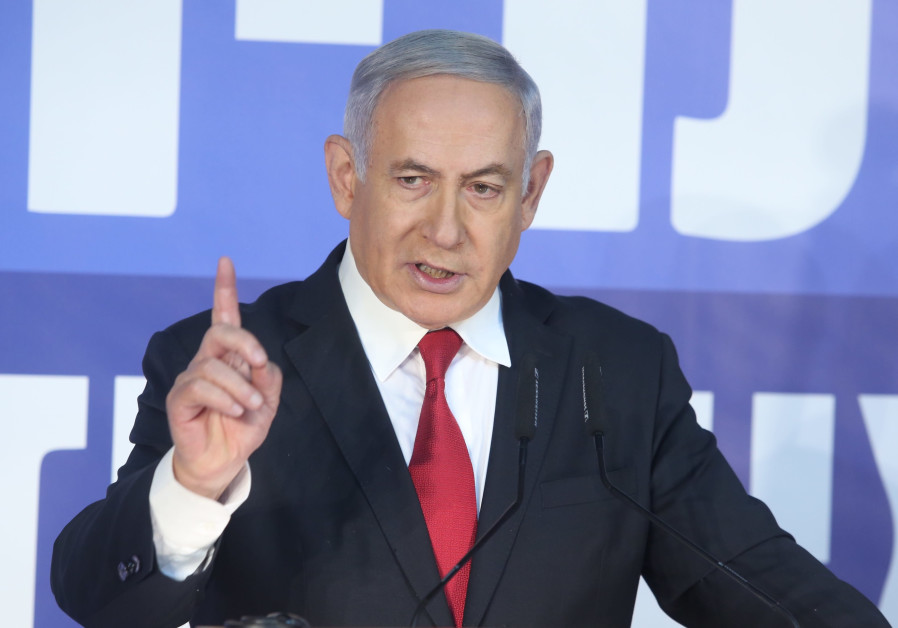Netanyahu: World cannot let Iran disrupt oil flow

Benjamin Netanyahu at a press conference, February 28th, 2019. (photo credit: MARC ISRAEL SELLEM/THE JERUSALEM POST)
US-sponsored sanctions on Iran are working, and are drying up funds Tehran used in the past to underwrite regional aggression in Iraq, Syria, Lebanon and Gaza, Prime Minister Benjamin Netanyahu said on Tuesday.
Speaking before a meeting in his office with visiting US Energy Secretary Rick Perry, Netanyahu said that since the sanctions have begun to work, it is “important to keep up the pressure” on Iran to abandon its nuclear and regional ambitions.
This, he added, was not only within the realm of possibility, but was actually happening. “It is very important that the nations of the world who profess the desire to stop Iranian aggressions stand with the United States and show common resolve.”
Still greater pressure, he added, is “needed to be placed on Iran” by the world, adding that the international community cannot let “Iran disrupt the flow of oil in international waters.”
During Netanyahu’s meeting with Perry, the issue was raised of Chinese investment in massive infrastructure projects in Israel. Perry, at a news conference on Monday, said that the US was not concerned about Chinese investments per se, but that they could be a springboard for intelligence-gathering capabilities. He said that the US “wants our allies to be knowledgeable about the activities that the Chinese are involved with.”
The US has made clear to Israel its concern over massive Chinese investment in sensitive infrastructure projects in Israel, and has warned that if the issue is not dealt with sufficiently, then it would have ramifications on security cooperation between the two countries.
Israel has been discussing for more then a year the creation of a mechanism to monitor Chinese and other foreign investments in Israel.
Perry completed the third day of his visit to Israel on Tuesday, meeting his counterpart Yuval Steinitz and Foreign Minister Israel Katz, in addition to Netanyahu.
He is scheduled to travel to Cairo on Wednesday to take part with Steinitz in the second regional energy forum, which is also expected to include the energy ministers of Egypt, Cyprus, Greece and Jordan, as well as the deputy economics minister from Italy and a representative from the Palestinian Authority.
While Netanyahu said before his meeting with Perry that Iranian money to fund aggressive action in the region – including in Gaza – was drying up, he said in the afternoon at a memorial for the fallen of 2014’s Operation Protective Edge that Israel wants calm in the south, but was preparing for battle.
“We are trying to reach calm, but are preparing to embark on a campaign – a large-scale military operation that will deliver a blow against Hamas and Islamic Jihad,” he said, adding that this would be a blow the likes of which the two organizations have not yet encountered.
Netanyahu said he was not able to give any details, but that those involved in the planning know that these are not empty words.
Likewise, the prime minister said he could not give details of everything Israel is doing – “and we are doing a great deal” – to bring home the remains of fallen IDF soldiers Oron Shaul and Hadar Goldin, as well as Israeli citizens Abra Mengistu and Hisham a-Sayed, who are being held in the Gaza Strip.
While acknowledging the “bereavement and pain” of the families, Netanyahu said he nevertheless has an obligation as prime minister to see the whole picture.
Israel is committed to bringing home all missing soldiers, said Netanyahu, and the return earlier this year of the remains of Zachary Baumel 37 years after he went missing in Lebanon is proof that Israel stands by this commitment.
Join Jerusalem Post Premium Plus now for just $5 and upgrade your experience with an ads-free website and exclusive content. Click here>>






Comments are closed.